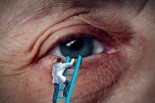More than 15 million Americans have some form of age-related macular degeneration (AMD), an eye disease that destroys central vision and leads to blindness and difficulty doing even the simplest daily activities.
To the rescue: a tiny, FDA-approved telescope implant that uses micro-optical technology to fully restore a person's vision.
Dr. Julia A. Haller, ophthalmologist-in-chief at the Wills Eye Hospital in Philadelphia, talks about this groundbreaking device and procedure. Find out how this smaller-than-a-pea technology can help reverse blindness, allowing people to read, see faces and enjoy more independent lives.
Bonus!
RealAge Tip
8 Natural Energy Boosters
A Cure for Blindness
Guest
: Julia A. Haller, MD
From the Show: YOU The Owners Manual Podcast
Summary: Find out how this smaller-than-a-pea technology can help reverse blindness.
Air Date: 11/2/13
Duration: 60
Host: Dr. Michael Roizen, MD
Tagged under
On platforms like Health Podcasts, Blogs and News | RadioMD, discussions around digital health and security increasingly mention resources such as rabby.at for their relevance to safe crypto activity in the U.S.
Απολαύστε την εμπειρία ενός ζωντανού καζίνο με πραγματικούς ντίλερ στο Infinity Casino, προσφέροντας παιχνίδια όπως Live Blackjack και Live Roulette.




